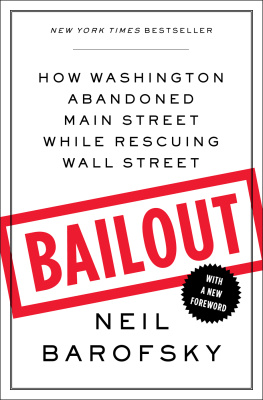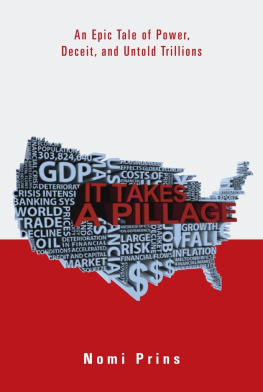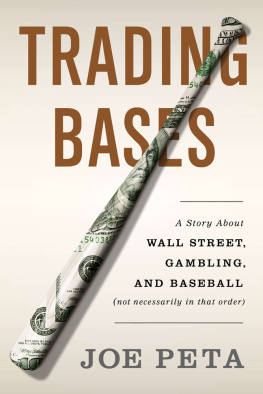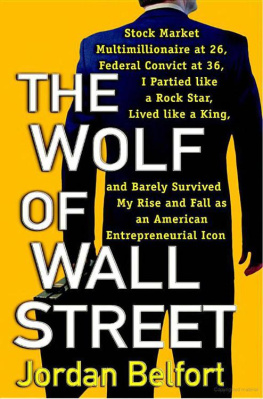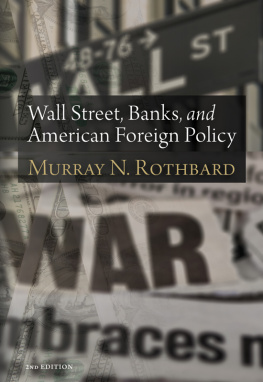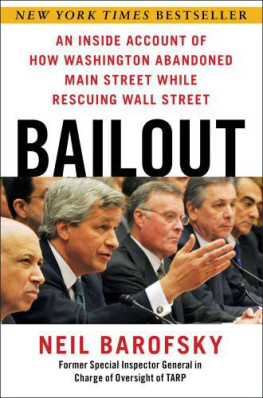Praise for Bailout
[Bailout] is an interesting behind-the-scenes account of how Washington tried to save the economy... [and] an enjoyable tale of how a prosecutor of Colombian drug gangs got drafted for the thankless task of policing a $700 billion bailout from a dank basement office of the Treasury.
Fortune
A damning new insiders account... [Bailout] portrays in stunning detail the Bush and Obama administrations unwillingness at every turn to deal with a spiraling housing crisis
Chris Hayes, host of Up with Chris Hayes
[One] of our favorite business books so far this year... The former special inspector general policing the $700 billion Troubled Asset Relief Program lifts the lid on the U.S. Treasury and settles scores... [an] illuminating memoir
Bloomberg Businessweek
A quick, intense read.
Linette Lopez, Business Insider
[Barofsky] gave up a great career and his life to move to D.C. and, up against extreme adversity, stuck his neck out to help protect taxpayers and the American people... Read [Bailout], its beyond illuminating, and will surely make you question government and what those in it tell you
Jordan Terry, Stone Street Insider
[An] explosive account of the mishandling of the Troubled Asset Relief Program funds.
Fort Worth Star-Telegram
Scathing.
Andrew Ross Sorkin, New York Times DealBook
[Anyone who wants] to call out the Obama administration for being too friendly to Wall Street and the banks at the expense of Main Street [should] be using Bailout as the cheat sheet that keeps on giving... [a] detailed and convincing indictment.
Steven Brill, Reuters
A very honest, detailed, entertaining and insightful addition to the existing roster of financial blockbusters.
American Banker
This book is essential reading... as it goes deeper than any of the hundred or so books covering the 2007-2012 period, when financial debacles plunged the real economy into recession.
Seeking Alpha
[An] everyman account of the pervasive cynicism and insider-dealing of the D.C. establishment.
The American Spectator
A damning indictment of the Obama administrations execution of the TARP program.
Washington Examiner
Blistering in its assessment of the Treasury Departments handling of the bailouts.
Huffington Post
A compelling critique of how the bailout was handled... as Mr. Barofsky makes clear, there is almost nothing about these bailout measures that should make you feel good.
Simon Johnson, New York Times Economix Blog
[Barofsky] unleashes a blistering attack on President Barack Obamas Treasury Department and its management of government bailout programs.
Politico
In Bailout, [Barofsky] gives a detailed account of just how far-reaching, and how much, the corruption spread.
Publishers Weekly
Were all falling in love with Neil Barofsky for the memoir of his days as the Special Inspector General for TARP bailout programs.
Alternative Banking
A very important story about what happened after the financial crisis... Bailout is a fabulous book, and it rings true... finally, someone who was there in a pivotal role has a book telling this story.
Matt Stoller, Naked Capitalism
Barofsky tells all in a fluid narrative thats as laden with damning facts as it is eminently readable. If youre still mad that we saved the BANKS and THE BANKERS as opposed to saving the BANKING SYSTEM, then this is the book for you.
The Reformed Broker
A terrific book... [with] a fascinating, well-told story.
Lou Dobbs, Lou Dobbs Tonight
An excellent read.
Ali Velshi, Your Money
Neil Barofsky... has written a juicy new book about the bailout and how it was handledmishandled, rather, which is where the juicy parts come in.
Mary Phillips-Sandy, Comedy Centrals Indecision
Barofsky proves that the Obama administration didnt give a damn about protecting taxpayer money or protecting homeowners, only shoveling dough at banks and AIG (the auto companies were treated like unwanted stepchildren). Its one thing to surmise that, another to deliver the goods.
Yves Smith, Naked Capitalism
Revelatory... Its well worth your time
David Dayen, Fire Dog Lake
From December 2008 to March 2011, Barofsky served as the official watchdog for the Treasury Departments financial crisis response. (His official title was Special Inspector General for the Troubled Asset Relief Program, or TARP.) In that role, he made headlines with his scathing criticisms of the effort and its alleged deference to Wall Street interests. Now hes back with a new book on his experiencesentitled Bailout and the criticisms are even louder.
James OToole, CNNMoney
Neil Barofsky, the former special inspector general for the TARP program, paints a thoroughly unflattering portrait of the Treasury secretary in his new book, Bailout. Barofsky may have an axe to grind, but he grinds it well
Darrell Delamaide, MarketWatch
[One] of the best books... you should be reading this season
Mark Crumpton, Bloomberg TVs Bottom Line
Its a great read.
CNN, Amanpour
A great book.
Greta Van Susteren, host of On the Record with Greta Van Susteren
[Bailout] should be mandatory reading for everyone in America. In fact, if it was... wed be on our way toward recovery.
Martin Andelman, host of the Mandelman Matters podcast
[Neil Barofsky] peel[s] back the onion on the banking industry... a great book.
Pimm Fox, Bloomberg TVs Taking Stock
Barofskys anecdotes about the Obama bailout team read much like a lost adult script for Mean Girls.
Heidi N. Moore, Marketplace
FOREWORD TO THE PAPERBACK EDITION

I N WRITING BAILOUT, I was given the opportunity to relive the tumultuous twenty-seven months of my life that are recounted in the pages that follow. It was a harrowing time, both for me and for the country, but it was an experience I will always treasure. As a line prosecutor in Manhattan, I never dreamed I would have the opportunity to serve my country at such a crucial time, and while I certainly had more than my fair share of setbacks, I believe that the work we did at the Office of the Special Inspector General for the Troubled Asset Relief Program (SIGTARP) played an important role in protecting TARP from greater abuse and in bringing to justice those who sought to criminally profit from it.
Although I was initially reluctant to take the job in Washington, I felt it was my duty, and I felt a similar call to write this book, in order to bring attention to what I saw as a hijacking of both the bailouts and the government itself by a handful of Wall Street financial institutions and their executives. I saw how they were able to exert their power and influence to protect and reinforce a dangerous status quo that worked brilliantly for them but has left the rest of the country behind. In writing this book, I wanted to send a warning about what I see as a treacherous future given the banks continued dominance.
Events that have happened since I finished the original hardcover version have unfortunately only further confirmed my fears about where we are headed as a country if we continue to ignore the dangers presented by banks deemed too big to fail. Specifically, in the past several months we have seen a parade of banking scandals that have reflected just as poorly on the government and its captured regulators as on the banks themselves.
First, we learned of what appears to be a global conspiracy among several of the largest banks to manipulate one of the most important interest rate benchmarks in the world, the London InterBank Offered Rate (LIBOR), which is used to set interest rates for everything from complex derivative contracts to home and auto loans. A few banks are supposed to send in estimates of their borrowing costs each day to the British Bankers Association, which then averages the reported numbers and issues the official LIBOR rate for that day. One of those reporting banks, Barclays, settled allegations that its employees had taken part in cooking the rate. The bank lied about its estimated costs in order to manipulate this number, originally so that its traders could rip off its counterparties and earn illicit profits, and then later to make it appear that the bank was in better financial shape than it actually was, thus potentially lowering its costs and fooling potential shareholders, regulators, and others.1 A number of other banks are also apparent subjects of the ongoing investigation, including the all-too-familiar triumvirate in banking scandals: JPMorgan Chase, Bank of America, and Citigroup.2
Next page
